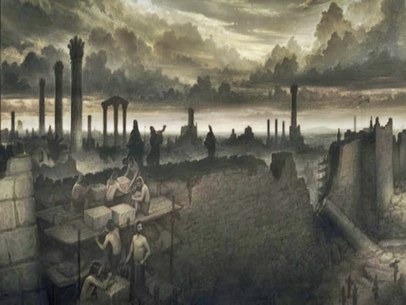
While this has certainly been a dismal election season, there is no reason to think that governance or democracy is ready to resume after the election. The dysfunction of the past is likely to ramp up to new heights, regardless of the outcomes. Hopeless? Scriptures remind us that God's promise awaits just beyond our field of vision.
Hopelessness characterized God's people in the time of the prophet Haggai. Twenty years after returning from Babylonian exile, now under Persian rule, the hope found in Second Isaiah at liberation from exile has become grinding poverty and daily struggle for most "back home." The Temple, devastated by the Babylonians decades before, remains a wreck, and the city walls along with it. These are daily reminders of failure and defeat that inspire only despair.
While political and religious leaders have failed to this point in addressing the concerns of the people, the prophet Haggai steps forward with God's word. He calls out not only the leaders but also the people to renew their faithfulness and commit to the re-building of the Temple. It is no attempt to capture the departed past, but a quest to design the future, to find the fulfillment of God's ancient promise to be with his people, to bring them from the depths to new life.
In Jesus' confrontation with the Sadducees in Luke 20, he gets asked a question about marriage on a hypothetical woman who is rightfully married successively to seven brothers, and the question to whom she would be married once in heaven. Some scholars debate this like it was some serious question. Hogwash! The Sadducees don't believe in the resurrection of the dead. In fact, it's a stupid question (Jesus castigates them in the Mark version) but Jesus doesn't simply brush it aside. He uses it as an opportunity to teach about the nature of God and God's promise that they've missed altogether.
God's promise can be hard (impossible?) to visualize when endings are upon us. However, as endings open to new beginnings, we find God's promise awaits the faithful.
Get the whole picture in the sermon video below, and note the downloads below the video panel.
Hopelessness characterized God's people in the time of the prophet Haggai. Twenty years after returning from Babylonian exile, now under Persian rule, the hope found in Second Isaiah at liberation from exile has become grinding poverty and daily struggle for most "back home." The Temple, devastated by the Babylonians decades before, remains a wreck, and the city walls along with it. These are daily reminders of failure and defeat that inspire only despair.
While political and religious leaders have failed to this point in addressing the concerns of the people, the prophet Haggai steps forward with God's word. He calls out not only the leaders but also the people to renew their faithfulness and commit to the re-building of the Temple. It is no attempt to capture the departed past, but a quest to design the future, to find the fulfillment of God's ancient promise to be with his people, to bring them from the depths to new life.
In Jesus' confrontation with the Sadducees in Luke 20, he gets asked a question about marriage on a hypothetical woman who is rightfully married successively to seven brothers, and the question to whom she would be married once in heaven. Some scholars debate this like it was some serious question. Hogwash! The Sadducees don't believe in the resurrection of the dead. In fact, it's a stupid question (Jesus castigates them in the Mark version) but Jesus doesn't simply brush it aside. He uses it as an opportunity to teach about the nature of God and God's promise that they've missed altogether.
God's promise can be hard (impossible?) to visualize when endings are upon us. However, as endings open to new beginnings, we find God's promise awaits the faithful.
Get the whole picture in the sermon video below, and note the downloads below the video panel.
| 11-06-16-ff-answers.pdf |
| 11-06-16-gods_promise_awaits.pdf |
